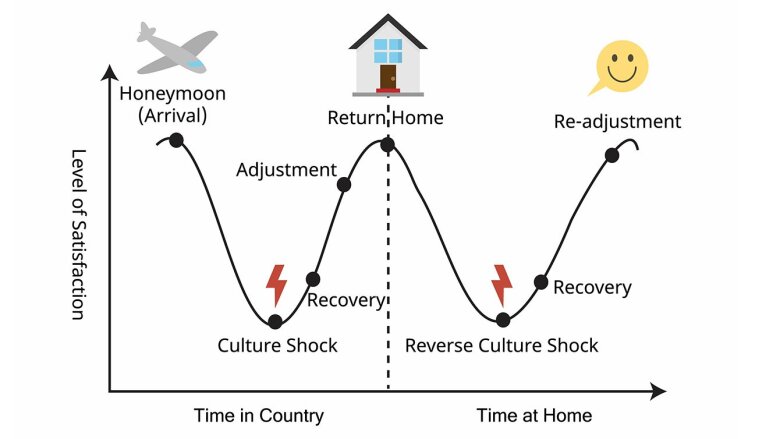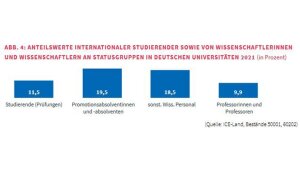
The University of Jena is attractive for international academics: around a quarter of all doctoral candidates in Jena come from abroad. Yet a doctorate with an international background also has potential obstacles: Whether it's financing the stay, problems learning German or experiencing a culture shock. To help you overcome these challenges, we have collected information and advice on these topics on this page.
Funding of the doctorate
If you come from abroad and want to pursue a doctorate in Germany, financing your doctorate can often be a key issue: in most cases, you will not be able to start your doctorate in Germany without funding, as proof of funding is required to obtain an entry visa and a residence permit (at least if you are from a non-EU country).
The ways in which you can finance a doctorate in Germany vary depending on the research discipline. There are basically four different options:
-
Applying for positions as a research assistant at a chair/institute
You can pursue your doctorate in a position as a research assistant at a chair/institute. These positions are usually temporary and part-time positions. There are basically two different types of positions that you can apply for in Germany:
- On the one hand, there are budget positions that are paid directly from the budget of a chair or institute. In budget positions, you are employed directly by the chair or institute of the supervisor. You will support the supervisor in carrying out the chair's or department's tasks, such as teaching courses for Bachelor's and Master's students, participating in the research programme and providing administrative support. At the same time, you will have the opportunity to work on your dissertation.
- On the other hand, there are so-called third-party funded positions, which are paid from a third-party funded project realised by a chair. In these positions, you will work on the research topic of the project and will also have the opportunity to qualify yourself. In these positions, you usually do not have to take on tasks of the chair, such as teaching.
If you would like to apply for these positions from abroad, it is important to carefully check the requirements stated in the job advertisement. Especially for positions in the humanities and social sciences, knowledge of German is often an important requirement, as the working language at the institute and in teaching is often German. In the natural and life sciences, English is more widely used as a teaching and working language at institutes. The language in which the job advert is written often gives an initial indication of the language skills expected.
The job market of the Friedrich Schiller University Jena can be found here.
-
Structured doctoral programmes
International researchers can complete their doctorate as part of a structured doctoral programme. This path to a doctorate is more common internationally than in Germany. However, doctorates within a structured doctoral programme are also becoming increasingly popular in Germany - particularly in the natural and life sciences.
In structured doctoral programmes, doctoral candidates conduct research within the thematic framework of a common research topic - the topic of the doctorate is therefore not completely freely chosen and must match the thematic focus of the programme. The doctoral candidates are supervised in teams and therefore do not have just one supervisor as is mostly the case during an individual doctorate. Funding is usually provided either through the programme's own positions or scholarships.
You can also apply for admission to such a programme from abroad. There are over 20 graduate schools, research training groups and doctoral programmes at the Friedrich Schiller University Jena. You can find an overview of the programmes here. There you will also find information on the frequency of calls for applications for new doctoral candidates in each programme.
-
Doctoral scholarships
There are many different organisations that award scholarships for doctoral candidates in Germany. The application procedure of the individual scholarship foundations and funding programmes varies. In order to apply for a scholarship, you already need a doctoral supervisor and a topic.
Most scholarships within Germany are awarded by the 13 organisations for the promotion of gifted students. The state of Thuringia also finances state graduate scholarships for doctoral researchers at the Friedrich Schiller University Jena. A frequently used scholarship for international doctoral candidates is the DAAD research scholarshipExternal link.
In addition to these scholarships that are not subject-specific, there are also numerous subject-specific scholarships. Many of these scholarships are publicly advertised. You can find some current announcements here. To search for subject-specific scholarships, we recommend that international doctoral candidates use the DAAD databaseExternal link or EURAXESSExternal link.
You can find general information on applying for a scholarship here.
-
Self-funded doctorate
As an international researcher, you can also start your doctorate if you have a certain amount of money saved up and deposited in a blocked account. In this case, you will have to look for a doctoral supervisor in Germany by yourself. The first step is to find a chair that best suits your research focus. A starting point for your search can be the list of all faculties at the University of Jena.
Once you have done this, you should send an e-mail to the professor asking whether he or she would be willing to supervise your doctorate. It is important that your enquiry contains the following information: Details of your previous academic achievements, the topic of your thesis and the subject area in which you would like to specialise. It is important that you explain how your research interests and experience match the research work of your future supervisor. Once you have received a letter of acceptance, you can make further preparations for your research stay.
Possible problems and challenges
Moving from one country to another can involve various problems. This also applies to starting an academic career in another country: being confronted with a new language, a foreign culture or a different academic system can lead to feelings of alienation. These feelings are normal and are shared by many - don't let them demotivate you! And please also bear in mind that completing a research stay far away from home is an achievement in itself and a sign of your special qualifications!
To support you during your stay, we would like to describe some of the possible problems below and show you strategies for overcoming them.
-
Language
It is usually no problem to communicate in English in an academic environment in Germany. Difficulties can only arise when dealing with authorities or academic administration, as German is (unfortunately quite often) the only language spoken there. Also, sometimes forms are only available in German. However, the university and the city do their best to employ people with English language skills at all levels. The Graduate Academy also offers a tutoring service that can accompany you when dealing with the local authorities.
If you already know that you will be staying in Germany for a longer period of time, we recommend that you take a German course as early as possible. Level B1 is enough to be able to communicate in Germany and if necessary apply for a permanent residence permit later on. Here you will find an overview of all language courses offered in Jena.
-
Culture shock
The greater the difference between the culture of origin and the German culture, the more likely it is that a so-called culture shockExternal link will occur. In most cases, however, this does not come about immediately. Initially, there is often a phase of excitement and fascination with the new country, in which you want to experience and learn as many new things as possible (the so-called honeymoon phase). After a certain period of time (often around three months), however, the differences between the cultures become more apparent, for example different eating habitsExternal link, social behaviourExternal link or different climatic conditionsExternal link. If setbacks in the research project or negative personal experiences are encountered during this phase, this can lead to culture shock: A feeling of foreignness and loneliness - often combined with the desire to be back in one's home country. Another factor that can exacerbate this is the language barrier, as people are unable to express themselves as they are used to. In this case, it helps to take advantage of networking opportunities (see below) and to realise that you are not alone with these experiences. After six months, this phase usually ends and you have become accustomed to the new culture and its peculiarities. The whole process is illustrated in the following diagram.
Phases of a cultural shock
Illustration: Adobestock.com/piscine26 -
Uncertain career prospects
Unfortunately, the German pathways to professorship are hardly comparableExternal link with international standards. In recent years, this has improved a little with the introduction of the tenure-track professorship. Nevertheless, international researchers are often uncertain about the long-term career prospects available in Germany. For this reason, the Graduate Academy regularly organises workshops in which the German academic system is explained to international researchers. Postdoc career counselling can also be used to discuss one's own path and clarify individual questions.
-
Bureaucracy in Germany
German bureaucracy can be frightening: Nobody likes submitting lots of documents to German authorities in a foreign language. Especially not when it comes to important issues such as a residence permit in Germany or an employment contract during your doctorate. But there is good news: We can help! The Graduate Academy has a tutoring service that helps to overcome the initial bureaucratic hurdles on arrival in Germany. And even later, international researchers can always turn to the Graduate Academy if they have problems with the German authorities.
-
Experiences of discrimination
Jena is a cosmopolitan and international city. The University of Jena has over 2,500 international students and almost 1,000 doctoral candidates from more than 100 countries. Campus life is colourful and intercultural. Despite all this, there can sometimes be experiences of discrimination in city life. If you have such experiences, please do not hesitate to report them to the university's Diversity Office.
Networking and counselling
The Graduate Academy offers general advice on all aspects regarding the organisation of your research stay. There is also a tutoring service to support you, especially when you arrive in Germany. If you feel excessively lonely or disorientated during your stay, you can contact the university's Mental Health First Aid Team.
It can also sometimes help to talk to others about your problems or feelings of alienation. This can help you to realise that you are not alone with your experiences. The Doctoral Researchers' Council of the University of Jena (DR.FSU) regularly organises events to exchange experiences with other doctoral candidates: Every month, for example, there is a regulars' table for all doctoral researchers at the universityExternal link. Furthermore, the "Together in Jena" group provides information about international events on its websiteExternal link and also organises its own events such as hikes. Another good starting point for networking is the International Centre Jena "Haus auf der Mauer"External link.
Facts and figures: Internationality of the German academic system
Development of the percentage of internationals in the German academic system
Graphic: Studie ICE-LandThe German academic system is very international in character: One in five doctorates is completed by an international researcher (as of 2021). This is a significant increase in comparison to the proportion of bachelor and master degrees awarded by universities, which account for 12 per cent. Overall, the proportion of academic staff with an international background has increased significantly in Germany in recent years: In 2012, the proportion was still 13 per cent; in 2021, it was already 19 per cent. However, this proportion drops again significantly at the level of professorships: only 10 per cent of all professorships were held by international academics in 2021. The proportion was significantly higher in natural sciences (13 per cent) than in social sciences and humanities (7 per cent). In 2023, a study by the German Academic Exchange Service investigated why professorships in Germany are less internationally appointed and what difficulties international researchers in Germany face on their way to a professorship. You can find the study hereExternal link.
More studies
- Hochschulrektorenkonferenz: Internationalität an deutschen Hochschulen (2018)External linkde
- Zeitschrift "Die Hochschule": Weltoffen von innen? Wissenschaft mit MigrationshintergrundExternal linkde
- Deutscher Akademischer Austauschdienst: Internationale Wissenschaftlerinnen und Wissenschaftler an deutschen Hochschulen: Von der Postdoc-Phase zur ProfessurExternal linkde
- Antje Wegner: Internationale Nachwuchswissenschaftler in Deutschland - Motivation – Integration – Förderung. Ergebnisse einer bundesweiten Studie (2016)External linkde
- Humboldt-Stiftung: Ein Eldorado der Forschung – und der Bürokratie. Befragung von Stipendiat:innen zwischen 2018 und 2022External linkde
- Berkeley Center for Studies in Higher Education: The Attractiveness of European HE Systems: A Comparative Analysis of Faculty Remuneration and Career PathsExternal link

